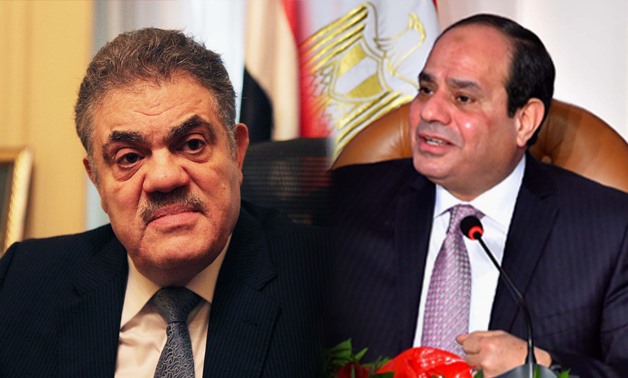
Collage photo of Egypt’s potential presidency candidates Abdel Fattah al-Sisi (R) and el-Sayed el-Badawy (L)– Egypt Today/Ahmed Hussein
CAIRO – 26 January 2018: By 5:00 pm Cairo time on January 26, 2018, no more potential candidates, except for President Abdel Fatah al-Sisi and head of Wafd party el-Sayyid el-Badawi, can compete for Egypt’s presidential election due in March.
As per the timeline of the National Election Authority, the potential candidates must submit their requests to conduct medical examination by 5:00pm on Friday. The medical examination assesses the candidates physically and mentally and is required amongst the candidacy papers for the presidency race.
The Administration for Specialized Medical Councils, which are affiliated with the Ministry of Health, has received the medical requests since January 20 and will close Friday at 5:00 p.m. A few hours before the deadline, Badawi conducted his medical checkup.
Last-minute candidate
Badawi submitted a request to the ministry of health and paid the medical examination fees on Friday, in order to provide his candidacy papers for the National Election Authority (NEA), stated Emad Kazem, head of the Specialized Medical Boards.
The 68-year-old candidate was chosen on Thursday by the Wafd Party to run as their candidate in the election. Two other potential candidates (lawyer Khaled Ali and former Prime Minister Ahmed Shafiq) withdrew from the presidential bid and former military chief of staff Sami Anan was disqualified over charges of “forgery”.

From the left, former Egyptian Prime Minister Ahmed Shafik, Lawyer Khaled Ali and former Military Chief of Staff Sami Anan – Egypt Today Ahmed Hussein
The Wafd Party used to be one of Egypt’s most influential political parties, especially after the end of World War I through to the 1930s. Most of the party’s leaders used to be very important members in the Egyptian society including former Prime Minister Saad Zaghloul who led the revolution of 1919 against the British colonization of Egypt.
On Tuesday, President Sisi underwent his medical checkup and on the following day he submitted his candidacy application to the National Election Authority to run for a second term as president. The application included his medical check-up results, tens of thousands of endorsement forms and over 500 recommendations from the 596-Member House of Representatives, according to the NEA.
The National Election Authority (NEA) will continue to receive the candidacy papers from the potential candidates until next Monday.
In order to qualify for the election, candidates must receive endorsements from a minimum of 20 MPs, or 25,000 citizens from at least 15 governorates, with at least 1,000 endorsements from each governorate. However, it was not announced yet how many endorsement forms Badawi can obtain or whether he could convince 20 members of the parliament to support his candidacy.
The presidential election was set to take place March 26-28, with a possible run-off scheduled for April 24-26. If no run-offs are necessary, the winner will be announced on April 2.
Who is eligible to vote the upcoming elections?
The number of citizens eligible to vote in the 2018 presidential election in March currently stands at roughly 58 million; names can still be excluded or added as per legal guidelines.
The voter database is set depending on three sources. First, the Civil Affairs Authority (CAA) affiliated with the Ministry of Interior as it possesses records of all citizens above the age of 18. Second, the Public Prosecution which makes lists of citizens denied of political rights. Third, the Ministry of Interior’s Passports, Emigration, and Nationality Administration (PENA) is responsible for complying lists of those who acquired Egyptian nationality more than five years ago.
NGOs apply to observe the presidential poll
48 non-governmental organizations (NGOs) have applied to the National Elections Authority (NEA) to observe the presidential poll, four of which are international organizations, said NEA spokesperson Mahmoud Helmy.
Twenty-one of the 48 have had their paperwork checked, all of which have met the conditions set out by the NEA. The remaining NGOs are expected to be checked within the next few days.


Comments
Leave a Comment